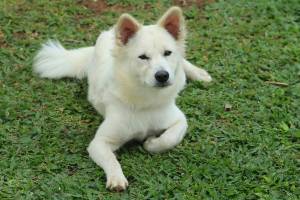
Understanding the root cause of your puppy’s biting behavior is the first step in addressing it. Puppies often bite as a way to explore their environment, play, or when they’re teething. Additionally, biting can be a sign of fear, anxiety, or frustration. By identifying the underlying cause, you can tailor your approach to discipline in a way that addresses the root issue, leading to more effective results.
Positive reinforcement is a powerful tool in training your puppy. When your puppy behaves well and refrains from biting, it’s important to reward them with treats, praise, or affection. By doing so, you’re reinforcing the behavior you want to see more of, helping your puppy understand that gentle behavior is not only appreciated but also brings positive outcomes. This approach can encourage your puppy to substitute biting with more desirable behavior.
Redirecting your puppy’s biting behavior towards appropriate toys and activities is a crucial part of discipline. When your puppy starts to nip or bite, promptly redirect their attention to a chew toy or engage them in an alternative activity. Doing so not only helps to protect yourself and others from painful nips but also teaches your puppy what is acceptable to chew on. Consistency in redirecting their behavior will help them learn what is and isn’t appropriate.
Socialization and interaction with other dogs and people are essential for puppies to learn bite inhibition. Through play with other dogs, puppies learn the limits of biting and how to control the pressure of their bite. Similarly, socializing with different people can help them understand that biting isn’t acceptable behavior. These experiences can help them develop important social skills and learn appropriate behavior while interacting with others.
Establishing and maintaining a routine for your puppy can significantly aid in reducing biting behavior. Puppies thrive on routines, as they provide a sense of stability and predictability. Consistent feeding, play, and rest times can help reduce stress and anxiety, which are common triggers for biting behavior. By creating a predictable environment, you can help your puppy feel secure and less likely to resort to biting as a coping mechanism.
Using a firm “no” and withdrawing attention when your puppy bites can help them understand that biting leads to a negative outcome. While it’s important to be gentle and patient with your puppy, setting clear boundaries is crucial. When your puppy bites, firmly say “no” and withdraw your attention for a brief moment. This communicates to your puppy that biting results in a loss of attention, which they value, and can help them learn that biting leads to an undesirable outcome.
Seeking professional guidance from a certified dog trainer or behaviorist can be invaluable if your puppy’s biting behavior persists despite your efforts. These experts can provide tailored advice and techniques to address the specific underlying causes of your puppy’s biting. Additionally, they can offer support and guidance to ensure that you and your puppy are on the right track toward resolving this behavior.
In conclusion, disciplining a puppy who’s biting requires patience, consistency, and understanding. By identifying the root cause of the biting behavior, using positive reinforcement, redirecting their attention, facilitating socialization, maintaining a routine, setting clear boundaries, and seeking professional guidance when needed, you can help guide your puppy toward more appropriate behavior. With time and dedication, you can effectively address your puppy’s biting behavior and foster a strong, trusting bond with your furry companion.






